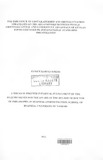| dc.description.abstract | The purpose of this research was to investigate the effect of cost leadership and differentiation strategy on the relationship between people oriented capital and competitive advantage of ISO certified firms in Kenya. This study had five objectives: The first objective was to determine the relationship 'between human capital and competitive advantage. The second objective was to establish the relationship between social capital and competitive advantage. The third objective focused on the relationship between psychological capital and competitive advantage.
The fourth objective was intended to establish the relationship between people oriented capital and competitive advantage and the fifth objective aimed at determining the effect of cost leadership strategy on the relationship between people oriented capital and competitive advantage. The sixth objective was to determine the effect of differentiation strategy on the relationship between people oriented capital and competitive advantage of ISO 9000 certified firms in Kenya.
The study was cross sectional survey of 67 ISO certified firms. Data was collected using structured questionnaires that contained measures of human capital, social capital, psychological capital, cost leadership, differentiation and competitive advantage. Data was analyzed using Pearson's correlation coefficient and regression analysis models. It was found that there are a significant relationships between human capital and competitive advantage. between social capital and competitive advantage, between psychological capital and competitive advantage, between people oriented capital and competitive advantage, and that cost leadership and differentiation strategies do not have a moderating effect on the relationship between people oriented capital and competitive advantage.
The overall conclusion was that people oriented capital bas a significant relationship with competitive advantage. The study concluded that cost leadership and differentiation strategies do not have a moderating effect on the relationship between people oriented capital and competitive advantage. This study has vital implications on policy, theory and practice in the management of organizations. The study recommended that future research focuses on a different setting particularly comprising non-ISO certified firms. | en_US |

